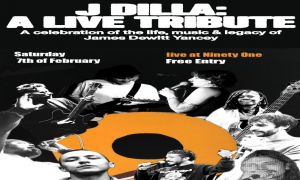By NICK DERISO
Introspective, but brimming with a raw-boned optimism, “American Central Dust" finds a focused Jay Farrar asking questions -- and being OK when he doesn't always get them.
That confidence of purpose, despite the unease of our fast-moving, recession-torn dynamic, seems to come from getting back to a stripped-down musical approach that once defined Son Volt and its leader -- both here and with his groundbreaking former alt-country band Uncle Tupelo.
“American Central Dust," perhaps best described as a return to the plaintive form of Son Volt's debut album “Trace," trades in the interesting though somehow unfulfilling musical experiments of “The Search" from 2007 for an intimate rusticism. As instantly recognizable characters try to make do with the table scraps of a lost American dream on this Rounder release, amid the fiddles, pedal and lap steels and piano, it's like seeing a Depression-era black-and-white photo come to life in the digital age.
Jay Farrar, singer and songwriter, eases into the middle of his epic lament for the heartland and its values like a dandy lion finding a way through cracks on the state highway. His insouciant singing style often has a kind of lazy brilliance, adding an off-handed depth.
He celebrates the simple things, and wonders about romance: “This love," Farrar croons on the opener, “is like celebrating the 4th of July with dynamite." “Roll On," a dream-like lament, makes the case for fighting through life's insistent ennui. Farrar looks around and sees the history -- recalling a sunken ship outside of Memphis which took 1,800 to a watery grave after a boiler blew, and singing “the Titanic of the Mississippi was the Sultana."
But these touches of Americana, happily, don't drag Son Volt into a somnolent doze.
The boozy, tremolo-drenched “Down to the Wire" echoes out with an insistent backbeat like the law's red wail. “Pushed Too Far" happily connects a pair of soul-lifting musical moments, played out hundreds of miles apart -- a night of blues picking by Snooks Eaglin at the Rock 'n' Bowl in New Orleans ("pure gasoline for the soul") and the duck-walking brilliance of Chuck Berry, heard up-river in St. Louis. “Jukebox of Steel," the galloping closer embedded below, embraces our nomadic prairie-pioneer desire to keep moving.
Those travels, of course, will often take us to unexpected insight.
“No Turning Back," which sounds like something from The Byrds' “Sweetheart of the Rodeo," starts out wondering what the post-industrial revolution's lasting effects will be on a hard-working nation -- but then left turns into a rumination on how manifest destiny impacted the planet beneath our feet in the first place.
The rousing “No Turning Back" drives us out into the sticks. Once there, though, the wide skies, empty side roads and lonely passing freight trains suddenly bring Farrar back to a lost love.
There are pleasing rushes of emotion as Farrar tops these hills. He looks all around, and discovers new things in familiar places.
“Strength and Doubt" ties all of these twilight emotions together -- admitting that we can be surrounded by grays and blues in this world but that we're bolstered by community. Together, we share “tales of strength and doubt, how to live without," and we go on.
Purchase: Son Volt -- American Central Dust
Introspective, but brimming with a raw-boned optimism, “American Central Dust" finds a focused Jay Farrar asking questions -- and being OK when he doesn't always get them.
That confidence of purpose, despite the unease of our fast-moving, recession-torn dynamic, seems to come from getting back to a stripped-down musical approach that once defined Son Volt and its leader -- both here and with his groundbreaking former alt-country band Uncle Tupelo.
“American Central Dust," perhaps best described as a return to the plaintive form of Son Volt's debut album “Trace," trades in the interesting though somehow unfulfilling musical experiments of “The Search" from 2007 for an intimate rusticism. As instantly recognizable characters try to make do with the table scraps of a lost American dream on this Rounder release, amid the fiddles, pedal and lap steels and piano, it's like seeing a Depression-era black-and-white photo come to life in the digital age.
Jay Farrar, singer and songwriter, eases into the middle of his epic lament for the heartland and its values like a dandy lion finding a way through cracks on the state highway. His insouciant singing style often has a kind of lazy brilliance, adding an off-handed depth.
He celebrates the simple things, and wonders about romance: “This love," Farrar croons on the opener, “is like celebrating the 4th of July with dynamite." “Roll On," a dream-like lament, makes the case for fighting through life's insistent ennui. Farrar looks around and sees the history -- recalling a sunken ship outside of Memphis which took 1,800 to a watery grave after a boiler blew, and singing “the Titanic of the Mississippi was the Sultana."
But these touches of Americana, happily, don't drag Son Volt into a somnolent doze.
The boozy, tremolo-drenched “Down to the Wire" echoes out with an insistent backbeat like the law's red wail. “Pushed Too Far" happily connects a pair of soul-lifting musical moments, played out hundreds of miles apart -- a night of blues picking by Snooks Eaglin at the Rock 'n' Bowl in New Orleans ("pure gasoline for the soul") and the duck-walking brilliance of Chuck Berry, heard up-river in St. Louis. “Jukebox of Steel," the galloping closer embedded below, embraces our nomadic prairie-pioneer desire to keep moving.
Those travels, of course, will often take us to unexpected insight.
“No Turning Back," which sounds like something from The Byrds' “Sweetheart of the Rodeo," starts out wondering what the post-industrial revolution's lasting effects will be on a hard-working nation -- but then left turns into a rumination on how manifest destiny impacted the planet beneath our feet in the first place.
The rousing “No Turning Back" drives us out into the sticks. Once there, though, the wide skies, empty side roads and lonely passing freight trains suddenly bring Farrar back to a lost love.
There are pleasing rushes of emotion as Farrar tops these hills. He looks all around, and discovers new things in familiar places.
“Strength and Doubt" ties all of these twilight emotions together -- admitting that we can be surrounded by grays and blues in this world but that we're bolstered by community. Together, we share “tales of strength and doubt, how to live without," and we go on.
Purchase: Son Volt -- American Central Dust


























